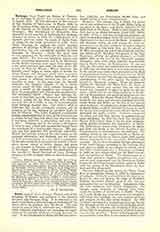

Berlanga, FRAY TOMAS DE, Bishop of Panama, b. at Berlanga in Spain, date uncertain; d. there August 8, 1551. He was professed at the convent of San Esteban of Salamanca, March 10, 1608, in the Dominican Order, and in time was elected prior of the convent on the Island of Hispaniola (Santo Domingo). The Dominicans of Hispaniola then depended on the province of Andalusia, but Berlanga obtained at Rome, in 1528, the establishment of a separate province under the name of Santa Cruz, of which he was made provincial in 1530. From Santo Domingo he claimed the newly founded province of Santiago de Mexico as being under his jurisdiction, but was successfully opposed by Fray Domingo de Betanzos. About the same time he was proposed for the Bishopric of Panama, and went thither. His vast and indefinite diocese embraced everything discovered, and to be discovered, on the South-American west coast, from which but a few years previous had come the news of the discovery of Peru by Pizarro. When, therefore, the Spanish crown began to notice signs of trouble between Pizarro and Almagro, about their respective territorial limits, it sent Bishop Berlanga to Peru with power to arbitrate between the two on any question at issue. At the same time the Spanish monarch, the Emperor Charles V, by a decree (cedula) dated July 19, 1534, ordered Berlanga to make a report on the condition and prospects of Peru, its geographical and ethnographic peculiarities. The arbitration failed. Pizarro had (perhaps because he had been secretly informed of the bishop’s mission) settled for the time being with Almagro and sent him off to Chile, so that no communication from Berlanga reached him. The latter’s office as arbitrator was thereby practically vacated, and he returned to his see, refusing all advances made to him by Pizarro. The latter displayed considerable feeling, complaining that, as long as the conquest was in doubt, he had been left alone, but that now that it had been achieved “a step-father had been sent to him”. Berlanga sent to the crown a description of what he saw, a brief and unvarnished report from the standpoint of a cool-headed observer. His mission was well intended, but practically impossible. Pizarro had artfully removed the other party to the proposed arbitration, and Berlanga was too honest to yield to insinuations of a one-sided investigation. Of the gifts tendered he accepted for himself a dozen silver spoons valued at twelve ducats, 600 pesos for the hospital of Panama, and 400 for the hospital of Nicaragua. After promoting the construction of the convent of Santo Domingo at Lima, Berlanga returned, in 1537, to Spain where he died in his native town.
AD. F. BANDELIER

